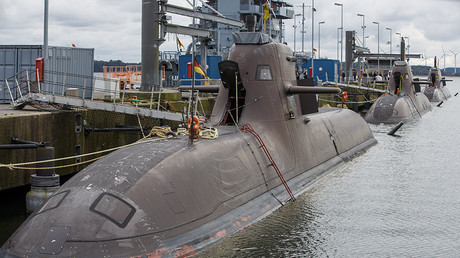German army admits most of its newly acquired military hardware is faulty & unfit for service

The bulk of the new military equipment delivered to the German Armed Forces last year is not ready for service, the German Defense Ministry has admitted, as the force struggles to free itself from a torrent of failures.
Out of 97 pieces of military equipment delivered to the Armed Forces in 2017, only 38 are fully operational, the German Defense Ministry acknowledged, in response to a parliamentary inquiry. The proportion of working equipment works out at about 39 percent, but the ministry hopes to boost these figures to 70 percent.
The fate of the cutting-edge Puma Infantry Fighting Vehicles (IFV) and the Airbus A400M military transport aircraft is what concerns the German military the most. Produced jointly by the German Kraus Maffei-Wegmann (KMW) and Rheinmetall corporations, the 43-ton Puma is thought to be one of the world's best-protected IFVs, while still having a high power-to-weight ratio. However, the ministry's figures reveal that only 27 out of 71 IFVs delivered to the army in 2017 were actually combat-ready.
Read more
The A400M is described by Airbus as "the most advanced, proven and certified airlifter available, combining 21st century state-of-the-art technologies to fulfill the current and upcoming Armed Forces' needs." However, out of eight aircraft delivered to the German Armed Forces, only half turned out to be ready for deployment.
The troubles the German forces are experiencing are, however, not limited to these two types of military hardware. Additional reporting by the Defense Ministry suggests that only two out of seven 'Tiger' strike helicopters are ready for service; in the case of the NH90 transport copters, its four out of seven.
The 2017 delivery of four Eurofighter jets also ended up with only one of them being actually put into operation while three others were returned to the manufacturers to be re-fitted with new main on-board computers.
The quality of new military equipment "still needs further improvements," the Parliamentary State Secretary for the Ministry of Defense Peter Tauber said, somewhat downplaying the situation.
The shortcomings in the military industrial complex have been sharply criticized by the lawmakers. "Brand new military equipment [delivered] directly from the production lines of the defense industry [facilities] does not work. It is unacceptable that the industries are provided with materials and funded but it does not work," Matthias Hoehn, an MP from the Left Party, who was behind the inquiry, said.
Read more
Hoehn also accused the German Defense Minister Ursula von der Leyen of "allowing defense industry bungling [worth] billions of dollars at the expense of the taxpayers." The minister herself called the statistics "not particularly meaningful," adding that the situation is "complex." "We know that there are certain shortcomings," she admitted.
The German military have been continuously struggling with a series of problems plaguing their equipment for quite some time. The German Army –known as Bundeswehr and one of NATO's largest militaries– is now a steady source of news about planes that can't fly, tanks that break down and vessels that are unfit for maritime operations.
In late September, it was reported that the German Navy's newest frigate, which should have been commissioned in 2014, will not launch until 2019, due to faulty systems and staggering costs. This has provoked fears that the ship might become outdated by the time it will actually enter service.
Last autumn, Germany was literally left without its entire submarine fleet as all of them were either on maintenance or in dire need of repairs. In November 2017, it also became known that more than half of the Bundeswehr's tank fleet is unfit for service. Only 95 out of 244 Leopard 2 main battle tanks were said to be combat-ready, while the remaining tanks were either disarmed or lacked critical spare parts.
In February 2018, it turned out that the he German military can't find enough money to fund a long-awaited modernization of the Puma IFVs. In August, it was also revealed that the existing vehicles are not suitable for tall soldiers.
Like this story? Share it with a friend!
[contf]
[contfnew]

RT
[contfnewc]
[contfnewc]





